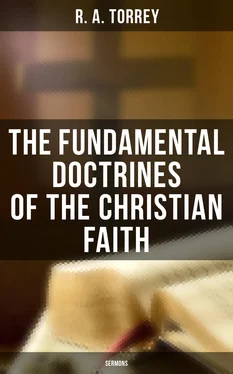II
The Christian Conception of God, or the God of the Bible as Distinguished from the God of Christian Science and the God of Modern Philosophy
Table of Contents
"God is Spirit."—John 4:24.
"God is Light."—1 John 1:5.
"God is Love."—1 John 4:8, 16.
Our subject this morning is "The Christian Conception of God, or The God of the Bible as Distinguished from the God of Christian Science and the God of Modern Philosophy." I have three texts: John 4:24: "God is Spirit."1 John 1:5: "God is Light."1 John 4:8, 16: "God is Love."These three texts give three of the most remarkable statements that were ever uttered and set before us in the clearest possible way the Christian conception of God as distinguished from every other conception of God. The Christian Scientists constantly quote one of our texts: "God is Love."In fact they quote it more than almost any other passage in the Bible, but they do not mean at all by "God is Love"what 1 John 4:8 or 1 John 4:16 evidently mean when taken in their connection. By "love" the Christian Scientists do not mean a personal attribute of God, but an impersonal abstraction which is itself God. Mrs. Eddy frankly and flatly denies the personality of God. The Christian Scientists not only say, "God is love," but they also say, "Love is God." They not only say, "God is good," but they also say, "Good is God." To say "Love is God" is an utterly different statement from saying, "God is love." You might just as well say "Spirit is God," because God says, "God is spirit," but all spirit is not God. Or you might as well say, "Light is God," because "God is light," but light is not God and love is not God, though God is love and God is light and God is spirit. What is meant by "love" in the inspired statement, "God is Love"? What is meant by the statement, "God is Love,"is shown by the definition or description of love given in the context and in the immediately preceding chapter—1 John 3:13-18. These verses clearly show that by the statement in 1 John 4:8 and 1 John 4:16, "God is Love"is not meant that God is an abstract quality, "love," and that the abstract quality of love is God, but what is meant is that God is a person whose whole being and conduct are dominated by the quality of love, that is, by a desire for and delight in the highest welfare of others. This will be evident to you if I read from the immediately preceding chapter (1 John 3:13-17): "Marvel not, brethren, if the world hateth you. (14) We know that we have passed out of death into life, because we love the brethren. He that loveth not abideth in death. (15) Whosoever hateth his brother is a murderer: and ye know that no murderer hath eternal life abiding in him. (16) Hereby know we love, because he laid down his life for us: and we ought to lay down our lives for the brethren. (17) But whoso hath the world's goods, and beholdeth his brother in need, and shutteth up his compassion from him, how doth the love of God abide in him? (18) My little children, let us not love in word, neither with the tongue; but in deed and truth."And from this chapter (1 John 4:7-17): "Beloved, let us love one another: for love is of God; and every one that loveth is begotten of God, and knoweth God. (8) He that loveth not knoweth not God; for God is love. (9) Herein was the love of God manifested in us, that God hath sent his only begotten Son into the world that we might live through him. (10) Herein is love, not that we loved God, but that he loved us, and sent his son to be the propitiation for our sins. (11) Beloved, if God so loved us, we also ought to love one another. (12) No man hath beheld God at any time: If we love one another, God abideth in us, and his love is perfected in us: (13) Hereby we know that we abide in him and he in us, because he hath given us of his spirit. (14) And we have beheld and bear witness that the father hath sent the Son to be the Saviour of the world. (15) Whosoever shall confess that Jesus is the son of God, God abideth in him, and he in God. (16) And we know and have believed the love which God hath in us. God is Love; and he that hath abideth in love abideth in God, and God abideth in him. (17) Herein is love made perfect with us, that we may have boldness in the day of judgment; because as he is, even so are we in this world."
The God of what is called "Modern Philosophy" is "The Absolute," and by "The Absolute" is generally meant a cold abstraction and not a clear, definite and warm personality Who loves, grieves, suffers, and Who works intelligently for others. And oftentimes the God of modern philosophy is not only " in all things" but is all things and all things are God. Such a God is no God at all. Whereas the God of the Bible, as we shall see as we proceed, is a Divine Person who exists apart from the world which He has created and Who existed before the world He created, Who bears definite relations to the world He has made and Who works along definite and clearly revealed lines. So we come face to face with the question, What sort of a Being is the God of the Bible, the real God, the one true God, the God of Christianity, the only God Whom we should worship and love and obey? The Kaiser also talks much about God and his followers are fond of saying, "Gott mit uns," but if any one will carefully study the Kaiser's utterances it becomes plain that he does not mean by God the God of the Bible, the Christian God, the God and Father of our Lord Jesus Christ.
Table of Contents
First of all "God is Spirit."This we read in our first text: John 4:24, "God is Spirit."You will note that in your Bible, both the Authorised and Revised Versions, you read, "God is a Spirit."But there is no indefinite article in the Greek language, and wherever it is necessary in the English translation to fit the English idiom, it has to be supplied, and it is supplied, in this case. But there is really no reason for supplying it here any more than there is for supplying it in 1 John 4:8 and translating, "God is a Love,"or in 1 John 1:5 and translating "God is a Light."The preferable translation is as I have given it: "God is Spirit."This is a definition of the essential nature of God. What does it mean? Our Lord Jesus Himself has defined what is meant by "spirit" in Luke 24:39, where He is recorded as saying after His resurrection: "See My hands and My feet, that it is I Myself; handle Me, and see, for a spirit not flesh and blood, as ye behold Me having."It is evident from these words of our Lord that spirit is that which is contrasted to body. That is to say, spirit is incorporeal, invisible reality. To say, "God is Spirit" is to say that God is essentially incorporeal and invisible (cf. 1 Tim. 6:16), that God in His essential nature is not material but immaterial and invisible, but none the less real. This thought is also found in the very heart of that revelation of Himself which God made to Moses in the first division of the Old Testament. For example, we read in Deut. 4:15-18: "Take ye therefore good heed unto yourselves; for ye saw no manner of form on the day that Jehovah spake unto you in Horeb out of the midst of the fire; (16) lest ye corrupt yourselves, and make you a graven image in the form of any figure, the likeness of male or female, (17) the likeness of any beast that is on the earth, the likeness of any winged bird that flieth in the Heavens. (18) The likeness of anything that creepeth on the ground, the likeness of any fish that is in the water under the earth."This is a plain declaration way back fifteen centuries before Christ, of the spirituality of God in His essential nature. God is essentially invisible spirit.
Читать дальше












